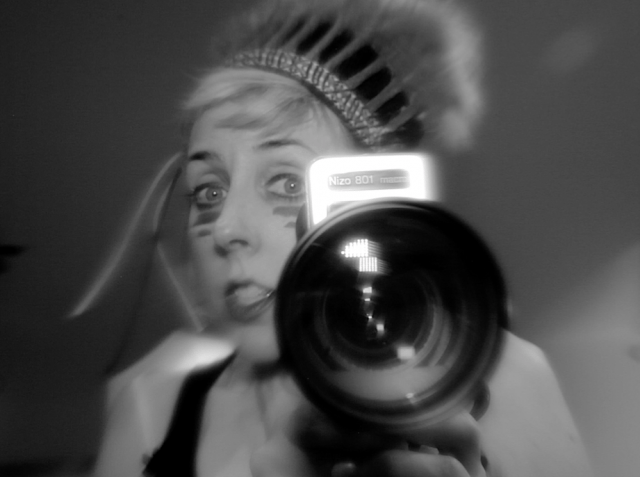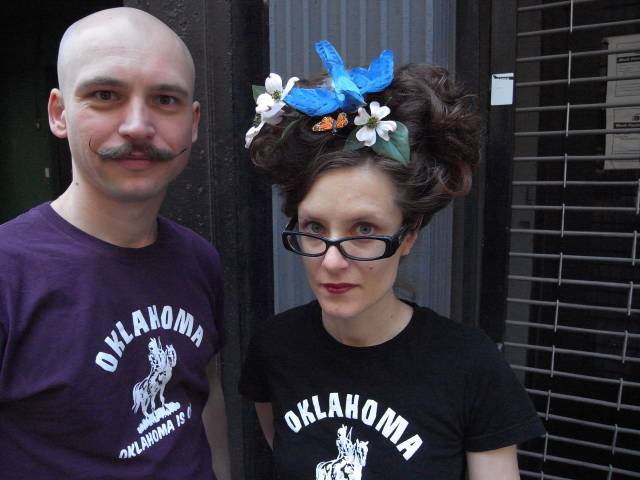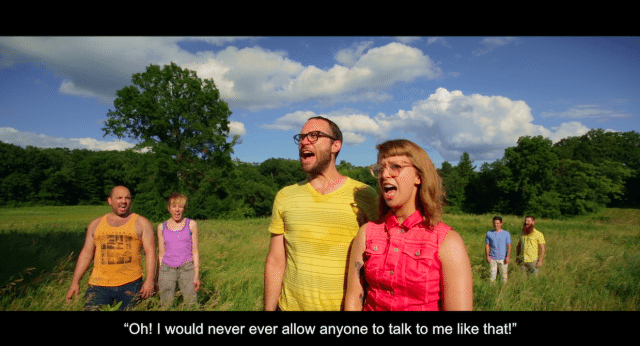

From the simple question “can you tell me your life story?”, the folks at Nature Theater of Oklahoma crafted one of the most epic enterprises in contemporary American theatre: Life and Times, a 9-part (so far) saga that has taken on the form of a murder mystery, a pop opera, a film, and a rap music video, among others. Using a verbatim script made out of stories by the company’s own Kristin Worrall, the artists have found an undeniable connection between the mundane and the holy, as they unleash a series of uneventful events onto the stage, or screen, that at first glance seem completely removed from ourselves, but prove to be so intimate that we can’t help but see them as mirrors.
Nature Theater of Oklahoma was founded by Pavol Liska and Kelly Copper, who share directing and camera duties in the latest installments, Episode 7, 8, 9, all of which will receive their New York premiere as part of FIAF’s Crossing the Line Festival. The almost 5 hours of film make for a unique experience that’s as intoxicating as it’s perplexing. The first episode (7 in this case) is a take on Orson Welles’ Citizen Kane, that takes us on a dizzying journey down Ms. Worrall’s college education and discovery of artistic pursuits, while the latter two are kaleidoscopic musicals set in locales that seem magical despite their earthiness. Life and Times will open this year’s festival and to mark the occasion I spoke to Pavol Liska and Kelly Copper about the creation of the last three episodes and where the series goes from there.
In an interview you did several years ago you spoke about not wanting to make any more work inspired by other artists, Episode 7 of Life and Times is Citizen Kane. How did you go from not wanting to do this kind of work to doing Citizen Kane?
Kelly: For every project we’ve done we usually try to choose a form that we’re working within and against. Much like the form for Episode 3 & 4 was Agatha Christie’s The Mousetrap, for Episode 1 we were inspired by musical theatre, so we’re always working with form. For 7 we knew we wanted to work within the feature film format and we chose Citizen Kane because it’s a pseudo-biopic which is what Life and Times is, and it’s arguably the American film.
Episode 7 is such a great adaptation too, I loved how faithful it was to Welles, but you also subvert the film. For starters your Citizen is a woman, and also there are some elements of David Lynch in there, not to mention the style of the acting. How do you come up with a cohesive pieces using all these different elements?
Pavol: There was also a lot of French New Wave influence, we used a lot of music from those films, so it was almost like a filmic manifesto. There was a lot of Bela Tarr, Godard, George Cukor, we tried those filters and took the tropes of the films we love, and it becomes unconscious eventually. We start with an idea and we work within the conditions we have. We didn’t have any studio available, and we had to show all these locations without having the means to get there, so we decided to do the entire film in our apartment, and the practical solution was to use rear screen projection. We blacked out all the windows in our apartment…
Kelly: ....in the middle of summer.
Pavol: We bought a relatively large green screen, a projector…
Kelly: …which we put in the bathroom.
Pavol: We collected the material for months before, so we could play it in our apartment. That was also inspired by the New York avant garde of the 60s in which people like Jack Smith were making films. They would make films on the roof, construct entire universes on a postage stamp.
Kelly: It’s funny, I just realized too that the only real locations around the world are in the newsreel. The foreign settings in the film we found around New York, parts of Hungary were factory spaces in Long Island City for instance.
No Dice was called a “myth”, which in a way Citizen Kane has always been. What about the myth attracts you?
The fact that is a kind of common knowledge, and we like to be in conversation with whatever people bring to the spectator situation. It’s archetypes and it’s more interesting for us to riff on something people have expectations upon. Last week we premiered Die Niebelungen, and it was interesting for us to go to a part of Germany where everyone knows the story, and play with it. We know that the audience can connect with the information, so we play with them on a different level: formal, humor, or anything else.
Live performances can be long and you’ve spoken about wanting to maintain control, how do you do this when it’s film? Is this an exercise in letting go as well?
Pavol: The best thing about film is you are able to really capture the things that you can’t control, you are able to provoke accidents that you are not able to use in live theatre because you’ve rehearsed over and over. I know people say live theatre consists of accidents, but they were not interesting accidents. What we discover in the theatre work is that the best part of the process happens in the middle of rehearsals, not in the beginning or end, but in the middle when you can still work intuitively and are still provoking accidents. We remain theatre animals, but we find film a suitable medium to capture what we find most interesting about performance. None of the film looks the way we want, that’s where we relinquish the control.
Kelly: The film is a story of its own making.

You’re a theatre company, but by making a film you’re making a spectacle that people can at some point watch at home, and it also would reach a bigger audience. Was this on your mind as well?
Pavol: For sure, when we look at ten years of our work in the theatre what’s left behind are a few memories of the people who got to see it, and a storage full of dirty outfits and useless, out of date equipment. We made this film three years ago, and being able to show our preoccupations at that time, and see our progression of ideas is a great thing. We love the fact that we can look at Jean Vigo films, he only made three or four films, and Richard Foreman, whose work has been so influential to us, his work is going to disappear. It’s not about leaving a legacy, it’s just a way of continuing a discourse so you don’t have to start over again, so you can look at the development of aesthetics and ideas.
Now that you mention Vigo, I just realized Kristin’s face in the film reminded me so much of Dita Parlo in L’Atalante.
Pavol: Definitely!
Kelly: She does look like her.
I’m a huge musical fan, and am always trying to convince people that musicals can be about anything, which is why I will use Episode 8 to prove my point. Why did you make this a musical?
Pavol: It’s always a process of figuring out the right form for each piece of material, the contents of the language of Episode 8, with all the 9/11 stuff, and the grandmother stuff, to be able to talk about this personal tragedy and national tragedy, and to put them on the same level we felt the subject matter deserved a more epic treatment. There’s also our love of the city, where we’re from, it felt like this was what it needed. Something different needed to happen in this episode.
Kelly: It was always going to be a choral piece, you move from the second, third person singular and move to a we.
And you’re continuing the thread the other pieces have which is having many voices tell the story of one person. Did the music in Episode 8 come first? I loved that in a way we see a history of theatre, since it starts in a church and then goes out into the world, like the sacred becoming the mundane.
Kelly: The score is by Dan Gower, he played the piano in Episode 1, did the score for Episode 5.
Pavol: The idea was always to make a religious work with Episode 8, we made Episode 5 with the illuminated manuscript, composed music for that and with this piece it was a challenge to see if we could make a modern kind of religious work. We’re always interested in spirituality and see where it goes, so we started in church, went to nature and end in the city.
Kelly: It’s a little bit like William Blake, Walt Whitman, it’s going back to the American transcendentalist man vs. nature. All of those were touchstones. Also, the inspiration was getting the hell out of a black box, and having the pleasure of exploring New York. We got on bikes, went through the city, went upstate for the first time, it was a chance to reconnect to landscape, weather.
Pavol: As much as the process of Episode 7 was shooting in our apartment, the process of Episode 8 was going out. It was made on bicycles, we had a cargo bike where we put all the equipment and we could go to any location we needed to. We took so many trips to get to some of these places, we biked all the way from Long Island City to Rockaway Beach so we could be there for sunrise, we did the same for Brooklyn Bridge we went there before people showed up, same with Times Square, the Staten Island Ferry.
Even the tracking shots were done on bicycle?
Pavol: There was a lot of walking and we did a lot of takes with a horse, but mostly it was me breaking my back, and someone holding a carrot next to me.

I was surprised reading the credits because you thanked the people of the city for not being annoyed at your singing. Does that mean you recorded the music live?
Pavol: No, it was recorded ahead of time.
Kelly: For the subway scene Robert [M. Johanson] had an earpiece and was just moving his mouth with nothing coming out, I’m sure everybody at 3AM on the train thought we were insane. We pretended we weren’t doing anything, we set up the camera but purposely didn’t look into it.
Episode 9 was just so great, can you please make a whole rap album?
(They laugh)
Pavol: You can ask, I’m not sure we’ll do it.
That episode is shot on location in beautiful Austria, and it has you guys wearing these bright tracksuits, all the bling, you’re mouthing rap songs, it’s such a cliché American image. Was this cultural clash part of what you were trying to show?
Pavol: We were aliens!
Kelly: It was an opportunity we had to work there, and then the actual final story was about a trip to Europe so we were able to make that work.
Pavol: The irreverence was part of it too, we went to stores and were annoying Americans with grills.
Kelly: We were super annoying.
When you mention “spacing out” it means the episode is about to end. On a narrative level it made me sad because I wanted more, but judging from your podcast in which you talk about spiritual matters sometimes, it made me think of taking a trip, to a place like enlightenment perhaps, although I don’t want to use that word.
Pavol: Don’t be afraid of enlightenment. You should look for it unabashedly.
I’ll try! For people who might have never seen your work and are afraid to approach it because they might not get it, or they think it might be too referential, why would you suggest they see Life and Times at the Crossing the Line Festival?
Pavol: Ideally there’s a lot of aesthetic pleasure to be experienced, every project we do is an independent project, there’s a story before of course and it’s better if you see all the episodes, but such is life! I like to not know what comes before, sometimes I enjoy starting a movie in the middle.
Kelly: I think the structure of these episodes is based on a phone call and those also have a beginning, middle and end, and they don’t come out of the last one.
Pavol: We structured Episode 7 so people could come in without any prior knowledge, that’s why the newsreel is there.
Does having reached Episode 9, mean we’re closer to Episode 10 and the 24-hour-long performance?
Kelly: I wish I could say yes, it became harder and harder to do the live shows. At this point it’s taken 8 years of everyone’s lives, we tried to keep the whole going but Episode 9 is the last thing we’ve made. I don’t see a possibility of putting them all together.
Pavol: We are lucky that we managed to finish the mission, the only thing we didn’t accomplish was to perform it all at once. But we did what we set out to do!
For more on Nature Theater of Oklahoma visit www.oktheater.org
For more information on FIAF’s 2016 Crossing the Line festival, visit: www.crossingtheline.org.